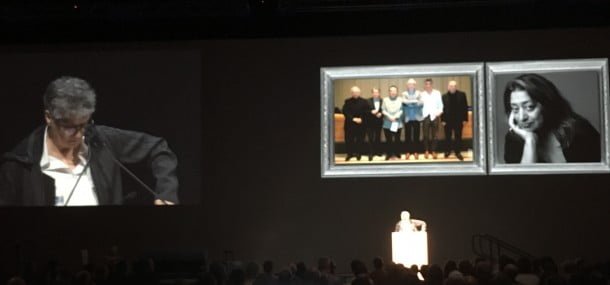Why do women knock back the chance to speak? Gill Matthewson explores the reasons women can be reluctant to get on stage, and encourages everyone to take a deep breath and go for it!

Nasine Seraji, paying homage to her friend Zaha Hadid at How Soon is Now?, the National Conference of the Australian Institute of Architects.
Something noticeable at the recent National Institute conference was the number of women present, both on and off stage. For a number of years conference directors have sought to get a solid proportion of women speaking – and kudos to them for doing so. There are also men, such as Jeremy Till, who refuse to appear on any architectural platform if the proportion is less than 30% women. Now, of course, under the Gender Equity Policy of the Australian Institute of Architects (which considers the representation and governance within the Institute and Institute-related organisations such as SONA), all committees, National and Chapter Councils, juries and selection panels are obliged to maximise fair and equitable access to opportunities for women.
But one of the stumbling blocks to this policy is an argument that recurs whenever an imbalance is pointed out: that women were asked and said no. Apart from the question of how many women were asked to produce such a result, why might women say no?
There are multiple reasons and most are based on gender stereotypes that are persistent in our society more generally. First, women might say no because they are genuinely too busy. When women have the primary responsibility for care at home (and in the majority of families this is the case), the time demands of being a council-member or preparing a talk are just too much. Second, there is a hesitancy for women to stick their head above the parapet, because it can get chopped off very fast if you are female. Third, despite stated beliefs in equality, our society tends to underestimate the abilities of women and overestimate those of men. This gendered under- and over-estimation is internalised and can powerfully affect our individual confidence levels; we doubt our abilities and think that we are not good enough or would not be good at the role.
How do we counter these stereotypes? At the individual level, if you are asked to do something or appear somewhere, please hesitate before you say no. If you are saying no because you are terrified, consider breaking the limitations imposed and self-imposed by stereotypes. If you are impossibly busy, suggest another woman who might take your place. At Parlour we are planning a list of women that can be consulted, but until then spread the load by recommending one of the thousands of women architects in this country who do not have the kind of public profile that gets them onto the usual invite list. Architecture forums can be robust and sometimes tricky, but are generally not where the nastiness of internet trolls lurks. And, finally, we urge you to tackle your doubts and realise that event organisers wouldn’t ask you if they weren’t confident you could do it. Take a deep breath and go for it, because when you become visible, we all become visible.
Gill Matthewson is a researcher, architect and educator, based at Monash University. Her PhD ‘Dimensions of Gender: women’s careers in the Australian architecture profession’ was awarded by the University of Queensland in 2015.




















